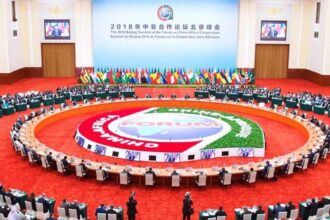At an emergency meeting in Abuja, Nigeria, on 30 July, the Economic Community of West African States (ECOWAS) demanded the “immediate release and reinstatement” of Niger’s elected president, Mohamed Bazoum. He had been held by the military since 19 July.
The regional bloc gave the military in Niger a one-week ultimatum to comply and warned it would take all measures necessary – including force – to restore constitutional order.
On 28 July, the head of Niger’s presidential guard, General Abdourahamane Tchiani, declared himself head of state after the military seized power.
Beyond warning against any regional and foreign interventions, the military leaders in Niger have given no indications of ways forward.
This coup d’etat will have a significant impact on peace and stability in Niger and the entire Sahel region.
Although Niger has recently enjoyed its longest democratic rule since independence, there has been a constant threat of coups. When Bazoum was elected president in 2021, there was a coup attempt about 48 hours before his inauguration. It failed as presidential guards fought off the coup plotters.
As a political scientist with expertise on international security, conflict analysis and governance in Africa, including knowledge on Niger, I explained then, the coup attempt pointed to deep fissures in the country. It suggested that the military had not fully embraced democracy.
The current coup plotters have blamed rising insecurity and a lack of economic growth. They stated that the intervention was necessary to avoid “the gradual and inevitable demise” of the country. I believe, however, there are other issues that precipitated the latest coup d’etat. These are: ethnicity; the presence of foreign forces; and the weakness of regional bodies.
Factors that led to the coup
There are no doubts that the rise in insecurity and declining economic prospects contributed to fragility in the country.
Despite the increase in foreign forces, especially from the US and France, and military bases in Niger, the leadership has been unable to stop insurgent attacks. There are several insurgent groups, such as Al-Qaeda and Islamic State affiliates, as well as Boko Haram operating in the country.
These attacks have resulted in thousands of deaths and displacements in the last decade. Hundreds of youths in the capital, Niamey, gathered to celebrate the July coup, waving Russian flags and chanting “Wagner”. This suggests that some people in Niger believe the military, supported by Russia and the private military contractor, Wagner group, would do a better job of fighting insurgents.
In addition to insecurity and economic stagnation, three other issues help explain the recent coup d’etat.
First, the debate over the ethnicity and legitimacy of Bazoum was an issue during the last election campaign. Bazoum is from Niger’s ethnic Arab minority and has always been labelled as having foreign origins.
This did not sit well within the military circle, which is predominantly composed of the larger ethnic groups – even though Bazoum got about 56% of the vote and is from the same party as former president Mahamadou Issoufou.
There is a lot of emphasis on ethnic military composition in the country; understanding this helped Issoufou complete two terms as president. Appointments in the military are made along ethnic lines.
Second, the large number of foreign military troops and bases in the country has not been well received by the military. They believe this undermines them. Niger is a key ally of western countries in the fight against insurgency in the region. France’s huge investments in Niger’s mining sector are another reason for its interest in security.
In 2019, the US opened a drone base in Niger despite protests. As I have pointed out before, the drone base could make Niger a target for terrorists and increase instability.
In 2022, France and other European allies withdrew their forces from neighbouring Mali. Bazoum was quick to invite them to Niger. The Nigerien military leadership and some influential individuals in the country denounced the increase in foreign forces.
Third, I suggest the failure of regional organisations such as ECOWAS and the African Union to take a firm stance against military power seizures in Guinea, Burkina Faso and Mali emboldened the Nigerien military. ECOWAS leaders have now threathened to use force to restore Bazoum if the coup plotters do not reinstate him.
In the last four years, there have been seven coup d’etats in the region. Three were successful. Leaders of ECOWAS and the African Union have threatened sanctions on these three countries, but nothing much has been done to deter other opportunistic military leaders.
In a round table organised by the think tank Chatham House London on the impact of military intervention in west Africa, one of the leaders from the region stated that they kept avenues of communication open with the three military presidents as a courtesy. This creates an impression that there is no deterrence for military takeovers.
Implications for Niger and the region
The latest coup d’etat has severe consequences for Niger and the entire Sahel region. Niger is a strong ally of western nations, especially France, the US and the European Union in fighting insurgency and curbing illegal migration to Europe.
Efforts to address these issues will be affected. And the new military leaders will want to use these issues as leverage in negotiations and to force acceptance of the new regime.
The new leaders in Niger might also engage with the Wagner group to combat the Islamist insurgency. The leader of the group has already praised them for seizing power. The influence of Russia and Wagner in the region could grow.
Yet Wagner has been unable to halt terrorist advancement in Mali and Burkina Faso.
Finally, a successful military takeover in Niger would be a major drawback for democracy in the region and Africa as a whole. The military regimes of Guinea, Mali and Burkina Faso already plan to form a “military alliance”, supposedly to combat insecurity.
African leaders need to do more to prove that they are working for the masses.
This story originally appeared on The Conversation and was republished with permission. Read the original article here.
NOW READ: Tensions rise as West African leaders rush to protect Niger after coup










